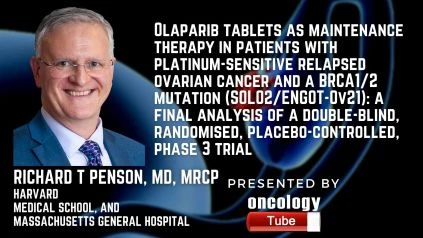Richard T Penson, MD, MRCP, Associate Professor, Medicine, Harvard Medical School, and Clinical Director, Medical Gynecologic Oncology, Massachusetts General Hospital speaks about Olaparib tablets as maintenance therapy in patients with platinum-sensitive relapsed ovarian cancer and a BRCA1/2 mutation (SOLO2/ENGOT-Ov21): a final analysis of a double-blind, randomised, placebo-controlled, phase 3 trial.Â
***This was for the ARIEL4, not the ARIEL3 trial.***
In Summary
Background information:
In the SOLO2/ENGOT-Ov21 trial, olaparib, a poly (ADP-ribose) polymerase (PARP) inhibitor, was shown to improve progression-free survival compared to placebo in patients with relapsed high-grade serous or endometrioid ovarian cancer who were platinum-sensitive and had a BRCA1 or BRCA2 (BRCA1/2) mutation. The aim of this final study is to see how olaparib affects overall survival.
Methods:Â
A total of 123 medical centers in 16 countries participated in this phase 3 experiment, which was double-blind, randomised, and placebo-controlled. Patients had to be at least 18 years old, have an Eastern Cooperative Oncology Group success status of 0–1, have histologically confirmed relapsed high-grade serous or high-grade endometrioid ovarian cancer, including primary peritoneal or fallopian tube cancer, and have undergone two or more platinum regimens. Using an integrated online or voice-response system, patients were randomly allocated (2:1) to receive olaparib tablets (300 mg in two 150 mg tablets twice daily) or matching placebo tablets. The duration of the platinum-free cycle and the reaction to prior chemotherapy were used to stratify the patients. Patients, service professionals, and data assessors were all unaware of their treatment designation. The primary endpoint, progression-free survival, has previously been documented. Overall survival was a primary secondary outcome that was examined in all of the patients that were assigned at random. Both patients who received at least one therapy dosage had their safety evaluated. This study is no longer accepting patients and has been registered with ClinicalTrials.gov as NCT01874353.
Finding:
295 patients were registered between September 3, 2013 and November 21, 2014. Patients were given either olaparib (n=196 [66 percent ]) or placebo (n=99 [34 percent ]) at random. Olaparib was not provided to one patient due to a mistake in the randomization process. For olaparib, the median follow-up was 657 months (IQR 636–693), while with placebo, it was 645 months (634–687). Unadjusted for the 38 percent of patients in the placebo population who underwent subsequent PARP inhibitor treatment, median average survival was 517 months (95 percent CI 415–591) with olaparib and 388 months (314%–486) with placebo (hazard ratio 074 [95 percent CI 054–100]; p=0054). Anemia was the most common treatment-emergent adverse condition of grade 3 or worse (which occurred in 41 [21 percent ] of 195 patients in the olaparib group and two [2 percent ] of 99 patients in the placebo group). 50 (26%) of 195 patients receiving olaparib and eight (8%) of 99 patients receiving placebo experienced serious treatment-emergent adverse events. Treatment-emergent adverse outcomes with a fatal result resulted in eight (4%) of the 195 patients who received olaparib, with six of them being deemed treatment-related (attributed to myelodysplastic syndrome [n=3] and acute myeloid leukaemia [n=3]).
Conclusion:
In patients with platinum-sensitive, relapsed ovarian cancer, and a BRCA1/2 mutation, olaparib offered a median overall survival advantage of 129% relative to placebo. Despite the lack of statistical significance, these results are clinically significant and justify the use of maintenance olaparib in these patients.

